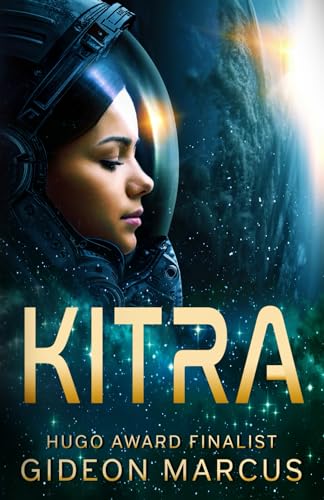
Kitra by Gideon Marcus is the book I wish that I’d read as a teenager.
At some point in my teen years, I jumped from reading the usual 8-12 age range, to reading full on adult fantasy. It wasn’t that YA wasn’t a genre that was around back then, but the sort of things which my local library stocked were… not my style. You couldn’t have paid me to read Sweet Valley High books.
I’m sure if I’d looked harder, I might have found something, but as a huge science fiction/fantasy nerd, I wanted books that echoed the popular culture that I loved. I wanted something akin to Stargate SG:1, to Star Trek: Voyager, to Farscape, to Phantasy Star Online, to Buffy… I ended up eye-ball deep in Neil Gaiman books, but what I really wanted was this.
Kitra is remarkable for many reasons. The most important one – that the protagonist is a queer person of colour – is probably the one I’m going to go into least detail about here. Not because I don’t think it’s worth discussing, but because I think other places do it better and I’d rather direct your attention there.
I think what I want to explore most is something that the author talks about in an interview:
“For the last twenty years, YA has been dominated by fantasy and dystopia. Don’t get me wrong – I enjoyed Harry Potter and The Hunger Games, but it got to the point where everyone was trying to write the next Harry Potter or Hunger Games. Space hasn’t gotten any less interesting; science shouldn’t be passé; and characters don’t need magic or special powers to be extraordinary.”
The relatively low stakes of the book – no galaxy to save, no galactic war, no overarching evil – gives it a very intimate feel. The group dynamics, the situation the crew finds themselves in, and the relationships between characters provide the conflict.
The plot is simple – the eponymous Kitra purchases a second hand spaceship, which doesn’t function as anticipated on its maiden voyage. The small crew find themselves stranded on an abandoned planet without fuel and with low food reserves, and need to rely on their own skills to get home.
And that’s it, really. Cue Apollo 13 meets Futurama.
With the exception of a flippant reference to a red light district (in a place that came across as Space-Amsterdam), and an accidental flashing, this doesn’t have anything that isn’t particularly unsuitable for younger readers. My eldest devoured it from cover-to-cover and is eagerly awaiting a sequel. I think both instances just went way over their head. This makes it a great book for a precocious reader, whose language skills are perhaps a little advanced for their age but may struggle with more mature themes.
It’s also a particularly timely book. It deals with the feelings of people living in very close quarters with one another, and about the ways in which love can wear thin. I think that’s something many of us can relate to, living in various states of lockdown as we have over the last twelve months. Reading something like this can help assuage the feeling that we’re alone.
I read this as an adult in a morning. It was just what I needed – there was enough plot to hook me, to keep me turning pages, and the writing was sound. Because Pandemic, I’ve been reading lighter things at the moment – romances, village mysteries and the like – so it was nice to branch out from that without leaving my comfort zone. I can imagine I’ll be reading more YA in the months to come.
Have you read Kitra? Are there any other YA books with relatively low stakes that you might recommend? I’d love to add some more to my list!
